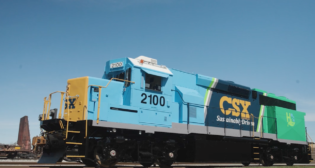
House T&I to STB: Look before you leap
Written by William C. Vantuono, Editor-in-ChiefOn March 25-26, 2014, the Surface Transportation Board (STB) will hold a public hearing on a petition by the National Industrial Transportation League (NITL) to modify STB’s standards for mandatory competitive switching. The House Committee on Transportation and Infrastructure has sent a bipartisan letter to STB Chairman Dan Elliot and Vice Chairman Ann Begeman indirectly urging them to consider the consequences for railroads should the Board accept NITL’s proposal, and strongly voicing the Committee’s intent to oppose such a policy change.
The letter, signed by Chairman Bill Shuster (R-Pa.); Ranking Member Nick Rahall (D-W.Va.); Subcommittee on Railroads, Pipelines, and Hazardous Materials Chairman Jeff Denham (R-Calif.); and Subcommittee Ranking Member Corrine Brown (D-Fla.), does not directly address the massive increases in operating costs and the detrimental affect on the rail industry’s ability to invest capital that mandatory competitive switching would create. The AAR has spent considerable resources making that argument. (“We’ve done a good job in expanding the discussion beyond what we would lose financially,” AAR chief executive Ed Hamberger recently told Railway Age. “We’re able to show what would happen if 7.5 million annual switch moves become controlled by shippers. We’re looking at a greatly reduced ability to plan, mounting operational problems, increased labor and fuel costs, and crowded yards. We’re able to show that mandatory competitive switching would result in close to a dozen extra moves in many situations.”)
Instead, the letter emphasizes what balanced regulation has done for the rail industry, and for the national economy, since the 1980 Staggers Act partially deregulated the railroads.
“In connection with this hearing, we would like to express our collective view about the importance of the freight rail industry as a critical component of our nation’s transportation system, and impress upon you the importance of maintaining the existing regulatory balance between the railroads and the shipping community,” the letter states. “As the Committee has previously expressed, the U.S. has the most efficient, affordable, and environmentally friendly freight rail network in the world. With nearly 140,000 miles of track carrying approximately 1.8 trillion ton-miles annually, freight rail is an immense jobs generator and a major economic driver. The industry directly or indirectly supports 1.2 million jobs, including some 180,000 well-paying jobs in the freight rail industry itself.
“Railroads account for approximately 40% of all freight ton-miles in the U.S.—more than any other mode. The passage of the Staggers Act in 1980 provided for a balanced regulatory system that has allowed the rail industry to build the world’s best freight rail system, while protecting shippers in areas where there is no effective competition. Since its passage, average inflation-adjusted rates are down substantially, and freight railroads have reinvested $550 billion to increase capacity, maintain existing capacity, and maximize efficiency on their operating networks. In fact, despite a weak economy, railroads have invested more back into their networks over the past five years—approximately $115 billion—than in any five-year period in their long history.
“This could not have been done, and will not happen in the future, in the absence of the current policy of balanced regulation by the STB that is called for in the Staggers Act— a policy that also has allowed railroads to concentrate traffic onto efficient routes, promote safer operations, and create fluid transportation systems. The Department of Transportation estimates that total freight shipments will increase by 62% between 2011 and 2040. It is critical that the freight rail industry be able to make the necessary investments to meet this rising demand.
“Any policy change made by the STB that decreases the railroads’ efficiency, and limits their ability to reinvest, grow their networks, and meet the nation’s freight transportation demands both today and in the future will be opposed by this Committee. We look forward to hearing from you about how the STB plans to ensure that the freight railroad industry will continue to play a major role in contributing to a strong and vibrant U.S. economy.”
Can Congress put a stop to potentialy damaging STB actions? Yes, says an industry observer: “Congress has legislative authority over the STB. Congress writes the law—the Interstate Commerce Act. Congress determines the budget for the STB. The Senate confirms nominees to the STB. The T&I Committee can make life miserable for Dan Elliott by bringing him up to the Hill for adversarial grillings and hearings.”



